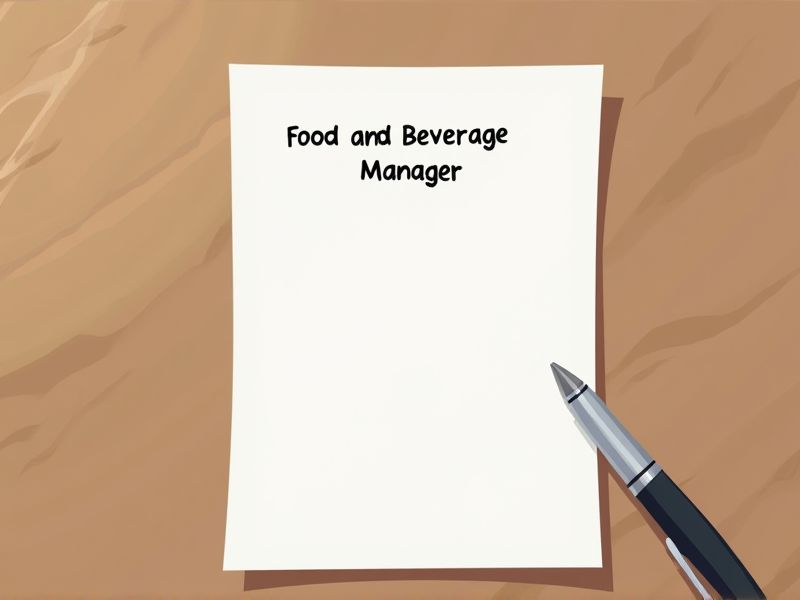
A Food and Beverage Manager oversees operations crucial for ensuring seamless service and client satisfaction in the hospitality sector. Certifications provide structured knowledge and evidence of proficiency, which enhances managerial competence and industry credibility. In a competitive environment, certifications can distinguish a manager's expertise in food safety, cost control, and customer service. Crucial certifications for Food and Beverage Managers include these.
ServSafe Food Protection Manager Certification
The ServSafe Food Protection Manager Certification is essential for a Food and Beverage Manager to ensure compliance with health and safety regulations, which helps prevent foodborne illnesses. Valid certification demonstrates a manager's proficiency in food safety protocols, increasing customer trust and satisfaction. It also equips managers with the skills necessary to train their staff effectively in proper food handling and storage practices. Legal obligations often require such certification to reduce liability risks for the establishment.
HACCP Certification
HACCP Certification is essential for a Food and Beverage Manager because it ensures that food safety hazards are systematically identified and controlled throughout the supply chain. Certification promotes compliance with legal and industry standards, reducing the risk of foodborne illnesses. Demonstrating a commitment to quality and safety, it enhances consumer confidence and trust. Implementing HACCP principles can lead to operational efficiencies and reduce food waste by minimizing contamination risks.
Certified Food Safety Manager (CFSM) Certification
The CFSM Certification is necessary for a Food and Beverage Manager because it ensures adherence to food safety standards, minimizing health risks for consumers. A certified manager is equipped to implement proper food handling and storage techniques, reducing incidences of foodborne illnesses. Knowledge from this certification enhances the manager's ability to train staff effectively, promoting a culture of safety within the establishment. Regulatory compliance is achieved, protecting the business from potential legal liabilities and reputational damage.
TIPS Alcohol Certification
TIPS Alcohol Certification equips Food and Beverage Managers with the necessary skills to effectively prevent alcohol-related incidents, enhancing safety in the establishment. This certification educates managers on legal responsibilities and liability issues surrounding alcohol service, mitigating potential legal risks. It instills best practices for responsible alcohol service, promoting a positive environment that supports customer satisfaction and business reputation. The certification allows Food and Beverage Managers to train staff more efficiently, ensuring consistent adherence to alcohol service policies.
Wine & Spirit Education Trust (WSET) Certification
Possessing a WSET certification enhances a Food and Beverage Manager's understanding of wine and spirits, which significantly improves their ability to curate a refined beverage menu. With this qualification, managers are better equipped to train and educate their staff, leading to improved customer service and increased sales. The certification also provides a competitive edge in hiring decisions, indicating the manager's commitment to expertise in the industry. Knowledge gained from WSET can help in cost-effective inventory management, reducing waste and optimizing profits.
Certified Hospitality Supervisor (CHS) Certification
The Certified Hospitality Supervisor (CHS) Certification equips food and beverage managers with advanced skills in leadership and operational management, enhancing their effectiveness in a competitive industry. Employers often prioritize candidates with CHS certification, attributing it to improved service quality and increased customer satisfaction. Employees holding such certifications usually demonstrate higher competency in training and developing staff, which is essential for maintaining service standards. The certification serves as a recognized benchmark, encouraging continuous professional development and instilling confidence in stakeholders regarding the manager's expertise.
Certified Hospitality Administrator (CHA) Certification
The CHA certification equips Food and Beverage Managers with advanced knowledge of hospitality management, which enhances operational efficiency and customer satisfaction. This qualification often leads to increased credibility and trust among peers and employers, potentially opening doors to prominent career opportunities. Food and Beverage Managers with CHA certification consistently display improved competencies in areas such as strategic planning and financial management, critical for business growth. Employers frequently prefer or require CHA certification, as it signifies a commitment to professional excellence and adherence to industry standards.
Food and Beverage Management Certificate Program
A Food and Beverage Management Certificate Program equips managers with up-to-date industry regulations and compliance knowledge, ensuring operational legality. Managers gain skills in cost control and efficient resource management, which can directly impact the profitability of a business. Training in customer service and human resource management enhances guest satisfaction and employee performance. Exposure to marketing strategies helps managers attract diverse clientele, improving business growth potential.
Project Management Professional (PMP) Certification
The PMP certification provides structured project management skills that significantly enhance a food and beverage manager's ability to execute complex projects like menu redesigns or new restaurant openings. With PMP training, managers gain competency in risk management, crucial for maintaining quality and safety standards amidst supply chain fluctuations. Certified managers can better organize resources and timelines, optimizing efficiency in an industry prone to unexpected challenges. Demonstrating PMP expertise often builds credibility among stakeholders, potentially leading to more substantial career advancement opportunities.
OSHA 30-Hour General Industry Certification
The OSHA 30-Hour General Industry Certification ensures that a Food and Beverage Manager understands workplace safety standards, which reduces the risk of accidents and injuries. Knowledge gained through this certification helps in implementing safety protocols that protect both staff and customers. Compliance with OSHA standards can prevent costly fines and legal issues. This certification supports the creation of a safe work environment, enhancing employee morale and productivity.
Summary
By obtaining certifications, you enhance your managerial skills and credibility in the food and beverage industry. Employers often recognize certified managers as more knowledgeable and competent, which can lead to advanced career opportunities. Certification increases your understanding of industry standards, resulting in improved operational efficiency and better customer service. You are likely to see improved financial results as enhanced management skills drive cost efficiency and greater customer satisfaction.
